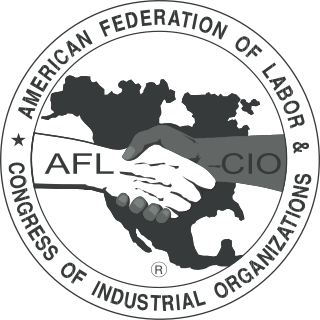The Labor Forward movement was an organizing program of the American Federation of Labor from roughly 1910 to 1920. The program, which took place in approximately 150 cities across the United States, was designed to convince workers of the labor movement's commitment to Christian ideals and labor–management cooperation.

The American Federation of Labor (AFL) was a national federation of labor unions in the United States founded in Columbus, Ohio, in December 1886 by an alliance of craft unions disaffected from the Knights of Labor, a national labor union. Samuel Gompers of the Cigar Makers' International Union was elected president at its founding convention and reelected every year, except one, until his death in 1924. The A.F. of L was the largest union grouping in the United States for the first half of the 20th century, even after the creation of the Congress of Industrial Organizations (CIO) by unions which were expelled by the AFL in 1935 over its opposition to industrial unionism. The Federation was founded and dominated by craft unions throughout its first fifty years, after which many craft union affiliates turned to organizing on an industrial union basis to meet the challenge from the Congress of Industrial Organizations (CIO) in the 1940s.

The United States of America (USA), commonly known as the United States or America, is a country composed of 50 states, a federal district, five major self-governing territories, and various possessions. At 3.8 million square miles, the United States is the world's third or fourth largest country by total area and is slightly smaller than the entire continent of Europe's 3.9 million square miles. With a population of over 327 million people, the U.S. is the third most populous country. The capital is Washington, D.C., and the largest city by population is New York City. Forty-eight states and the capital's federal district are contiguous in North America between Canada and Mexico. The State of Alaska is in the northwest corner of North America, bordered by Canada to the east and across the Bering Strait from Russia to the west. The State of Hawaii is an archipelago in the mid-Pacific Ocean. The U.S. territories are scattered about the Pacific Ocean and the Caribbean Sea, stretching across nine official time zones. The extremely diverse geography, climate, and wildlife of the United States make it one of the world's 17 megadiverse countries.
Christianity is an Abrahamic religion based on the life and teachings of Jesus of Nazareth, as described in the New Testament. Its adherents, known as Christians, believe that Jesus Christ is the Son of God and savior of all people, whose coming as the Messiah was prophesied in the Old Testament.
Although initial reports were that the program had generated large crowds and warm responses from employers, large numbers of new trade union members never appeared and the program was shut down.
A trade union, also called a labour union or labor union (US), is an association of workers in a particular trade, industry, or company created for the purpose of securing improvement in pay, benefits, working conditions or social and political status through collective bargaining and working conditions through the increased bargaining power wielded by creation of a monopoly of the workers. The trade union, through its leadership, bargains with the employer on behalf of union members and negotiates labour contracts with employers. The most common purpose of these associations or unions is "maintaining or improving the conditions of their employment". This may include the negotiation of wages, work rules, complaint procedures, rules governing hiring, firing and promotion of workers, benefits, workplace safety and policies.
In some respects, the program is similar to the "Labor in the Pulpits/on the Bimah/in the Minbar" program co-sponsored by the AFL–CIO and Interfaith Worker Justice in the 2000s.

The American Federation of Labor and Congress of Industrial Organizations (AFL-CIO) is the largest federation of unions in the United States. It is made up of fifty-five national and international unions, together representing more than 12 million active and retired workers. The AFL-CIO engages in substantial political spending and activism, typically in support of Democrats and liberal or progressive policies.
Interfaith Worker Justice (IWJ) is a nonprofit and nonpartisan interfaith advocacy network comprising more than 60 worker centers and faith and labor organizations that advance the rights of working people through grassroots, worker-led campaigns and engagement with diverse faith communities and labor allies. IWJ affiliates take action to shape policy at the local, state and national levels.
![Samuel Gompers American Labor Leader[AFL]](https://upload.wikimedia.org/wikipedia/commons/thumb/8/8e/Samuel_Gompers_cph.3a02952.jpg/215px-Samuel_Gompers_cph.3a02952.jpg)






